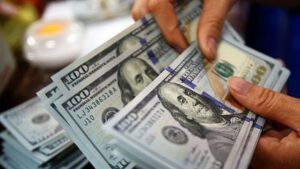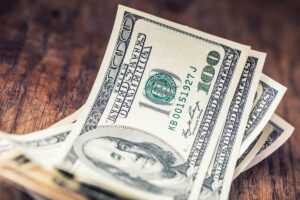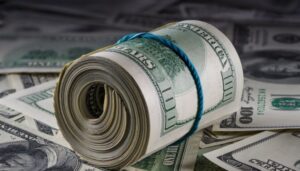
The dollar rises moderately against the euro and the pound sterling, but weakly depreciates against the yen as market participants assess statements by members of the U.S. Federal Reserve (Fed).
The ICE-calculated index showing the U.S. dollar against six currencies (euro, Swiss franc, yen, Canadian dollar, pound sterling and the Swedish krona) is up 0.16%, while the broader WSJ Dollar Index is up 0.14%.
The Fed will raise the benchmark interest rate by at least another 1 percentage point or more, and only after that could it take a pause, Mary Daley, head of the Federal Reserve Bank (FRB) of San Francisco, said the night before. A rate range of 4.75-5.25 percent “is a reasonable level to consider,” she told CNBC.
Kansas City Fed Governor Esther George also said the Fed should not stop raising rates too soon, and added that the goal of achieving a “soft landing” could be difficult.
The Fed has raised the benchmark interest rate by 3.75 percentage points (pp) in less than a year, increasing it by 0.75 pp at once in the last four meetings. The rate is currently at 3.75-4% per annum, and the market expects it to rise by 50 bps in December.
By 8:52 Moscow time the euro/dollar pair is trading at $1.0378 versus $1.0396 at the close of Wednesday’s session and the euro is losing about 0.2%.
The dollar/yen exchange rate is down 0.1% at 139.39 yen, down from 139.54 yen at the end of last session.
The pound is getting cheaper by 0.2% and trades at $1.1895 against $1.1915 the day before.
On Thursday the market is waiting for the final data on October inflation in the euro area and data on the construction of new houses in the USA.

The dollar is moderately depreciating against the euro and appreciating against the yen on Wednesday morning as investors assess geopolitical risks and U.S. inflation data.
The ICE-calculated index, which shows the U.S. dollar’s performance against six currencies (euro, Swiss franc, yen, Canadian dollar, pound sterling and Swedish krona), is up less than 0.1%, as is the broader WSJ Dollar Index.
The day before, the dollar index had fallen to a three-month low on further signals of slowing U.S. inflation.
As it became known on Tuesday, producer prices in the United States (PPI) rose 8 percent year-over-year in October and 0.2 percent against September. Analysts polled by Trading Economics forecasted an average increase of 8.3% for the former index and 0.4% for the latter.
Meanwhile, Rafael Bostic, head of the Federal Reserve Bank (FRB) in Atlanta, expressed the view that the Fed should continue to raise interest rates until there are signs of widespread easing in inflation. “We haven’t seen that yet, so I believe we will need new rate hikes,” Bostick wrote. He added, however, that he sees “glimmers of hope” in the past three months, but prices are falling mostly for goods, not services.
The currency market is also reacting to news of a rocket explosion in Poland, which killed two people. A number of media outlets wrote that the missile could have come from Russian territory.
However, Polish President Andrzej Duda said the government could not yet confirm who fired the missile, and U.S. President Joe Biden said it was unlikely that it came from Russian territory.
The Russian Defense Ministry denied that the rockets were Russian, saying that the military had not struck any targets near the Ukrainian-Polish border.
The euro/dollar pair was trading at $1.0370 by 7:52 a.m., versus $1.0350 at the close of Tuesday’s session, with the euro strengthening 0.2%.
The dollar/yen is up 0.4% at 139.82 yen, up from 139.31 yen at the end of last session.
The pound is stable and trading at $1.1865.

The US dollar is getting cheaper against the euro and the pound sterling during the trading session on Tuesday.
The day before, the U.S. currency steadily strengthened on statements by Federal Reserve (Fed) officials that dampened investor optimism that the rate hike cycle may end soon.
Fed Vice Chair Lale Brainard told Bloomberg on Monday that the Fed is likely to slow the pace of rate hikes soon.
“However, I think it’s important to emphasize: we’ve done a lot already, but we still have more work to do,” Brainard said.
Earlier Monday, her colleague Christopher Waller, a member of the Fed’s board of governors, warned investors against overly optimistic about the timing of the end of the policy tightening cycle, noting that the Fed still has much work to do.
“We have a long, very long way to go to slow inflation. The rate will continue to rise, and it will stay high for a while, until we see it get closer to our target level,” Waller said at an event in Sydney hosted by UBS.
The ICE-calculated index, which shows the dollar’s performance against six currencies (euro, Swiss franc, yen, Canadian dollar, pound sterling and Swedish krona), added 0.2% on Tuesday, while the broader WSJ Dollar lost 0.03%.
The euro/dollar pair is trading at $1.0333 as of 9:15 a.m. Ksk, compared to $1.0329 at the close of the previous session. The pound rose to $1.1776, compared to $1.1760 the day before.
The dollar rose to 140.31 yen against 139.88 yen at the close of previous trading.
The exchange rate of the U.S. currency paired with the yuan dropped to 7.0491 yuan against 7.0740 yuan the day before. On Tuesday, the People’s Bank of China (PBOC, the country’s central bank) injected 850 billion yuan ($120.7 billion) into the financial system as part of its medium-term lending program (MLF).

The National Bank of Ukraine’s net sales of dollars this week decreased to $295.0mn from $393.9mn a week earlier.
According to the National Bank on its website, it bought $31.5 million from November 7 to 11, which is markedly more than the usual volume of purchases during the war ($7-8 million), while it sold $326.5 million, compared to $410.2 million a week earlier.
On the cash market, the hryvnia weakened by about 0.2 UAH per week, to about UAH 40.55/$1. However, the spread between the buying and selling rates remains narrow.
In October, the volume of interventions of the National Bank amounted to $2.03 billion, compared to $2.75 billion in September, $1.33 billion in August and $1.2 billion in July, and remains much less than in June ($3.96 billion) and May ($3.4 billion).
In total, since the beginning of the year to November 11 inclusive, the NBU bought $3 billion 210.8 million and EUR111.0 million in the market, while it sold $22 billion 244.8 million and EUR1 billion 789.1 million.
Since the beginning of the war the purchase of currency reached $2 billion 553.9 million and EUR111.0 million, while the sale reached $19 billion 474.6 million and EUR1 billion 789.1 million.
Ukraine’s international reserves as of November 1, 2022, according to the NBU, amounted to $25 billion 244.2 million (in equivalent), which is 5.5% more than at the beginning of October.

Gold prices are rising in trading on Friday, continuing to rise after rising to the highest since August the day before.
Market is supported by hopes for a possible slowdown in the pace of tightening of monetary policy by the U.S. Federal Reserve (Fed) in December, which put pressure on the dynamics of the dollar, writes MarketWatch.
Prices of December contracts for gold on the New York Mercantile Exchange (NYMEX) rose by 0.46% to $ 1761.7 per troy ounce by 16:39 kcd. Gold is near its highest level since August.
The ICE U.S. Dollar index, which tracks the dollar’s performance against six major world currencies, is down about 1% in trading. The day before it was down 2 percent.
As it became known on Thursday, consumer prices (CPI) in the United States rose by 7.7% in October against the same month last year after an increase of 8.2% in September. Thus, inflation slowed to its lowest since January and was well below market forecasts.
The data may affect the policy of the U.S. Federal Reserve (Fed), which is aggressively raising interest rates in an attempt to curb inflation.
At the same time, prices for other precious metals showed no unified dynamics on Friday.
Silver for December delivery was down 1 percent at $21.5 an ounce.
Palladium prices rose 2.7% to $2007.5 an ounce and platinum fell 0.5% to $1049.3 an ounce.

The exchange rate of US dollar weakly changes on Wednesday morning against major world currencies as investors await the outcome of the mid-term elections to the U.S. Congress.
The ICE index which shows the trend of the US dollar against six currencies (euro, Swiss franc, yen, Canadian dollar, British pound and Swedish krona) is growing by less than 0.1%. Over the past three sessions, the indicator has fallen nearly 3%.
The euro/dollar pair was trading at $1.0073 by 7:55 a.m. qtr. versus $1.0075 at the close of Tuesday’s session.
The dollar/yen is up less than 0.1% at 145.77 yen from 145.69 yen at the end of last session.
The pound is trading at $1.1541, up from $1.1546 at the close of previous trading.
The Republican Party is expected to outperform Democrats in the midterm elections for U.S. Congress, according to U.S. media forecasts. According to CNN’s preliminary forecast, Republicans hold 176 seats in the U.S. House of Representatives, while Democrats have 121 seats. Politico predicts 158 seats for Republicans and 99 for Democrats. One party needs 218 seats out of 435 to control the House of Representatives.
In the Senate election, CNN and Politico predict that Republicans and Democrats are tied at 46 seats each. Republicans need 51 seats to control the Senate – with Vice President Kamala Harris, who is from the Democratic Party, having the right to vote in controversial situations.
In addition, market participants are waiting for data on October inflation in the U.S., which may influence the Fed’s decision. The report will be released Thursday, and analysts polled by Trading Economics on average expect it to point to a slowdown in inflation in October to 8% from September’s 8.2%.
Meanwhile, the mainland yuan gained 0.1% to 7.2445 per $1, while the offshore yuan, which is traded in Hong Kong, strengthened 0.2% to 7.2459 per $1.
China’s inflation slowed in October to its lowest level since May, we learned Wednesday. Consumer prices (CPI) rose 2.1 percent year on year last month after climbing 2.8 percent in September, while analysts on average had expected a more moderate slowdown to 2.4 percent.
Compared with the previous month, consumer prices in the PRC rose 0.1% in October after rising 0.3% a month earlier. Experts predicted that the growth rate would remain at the September level.